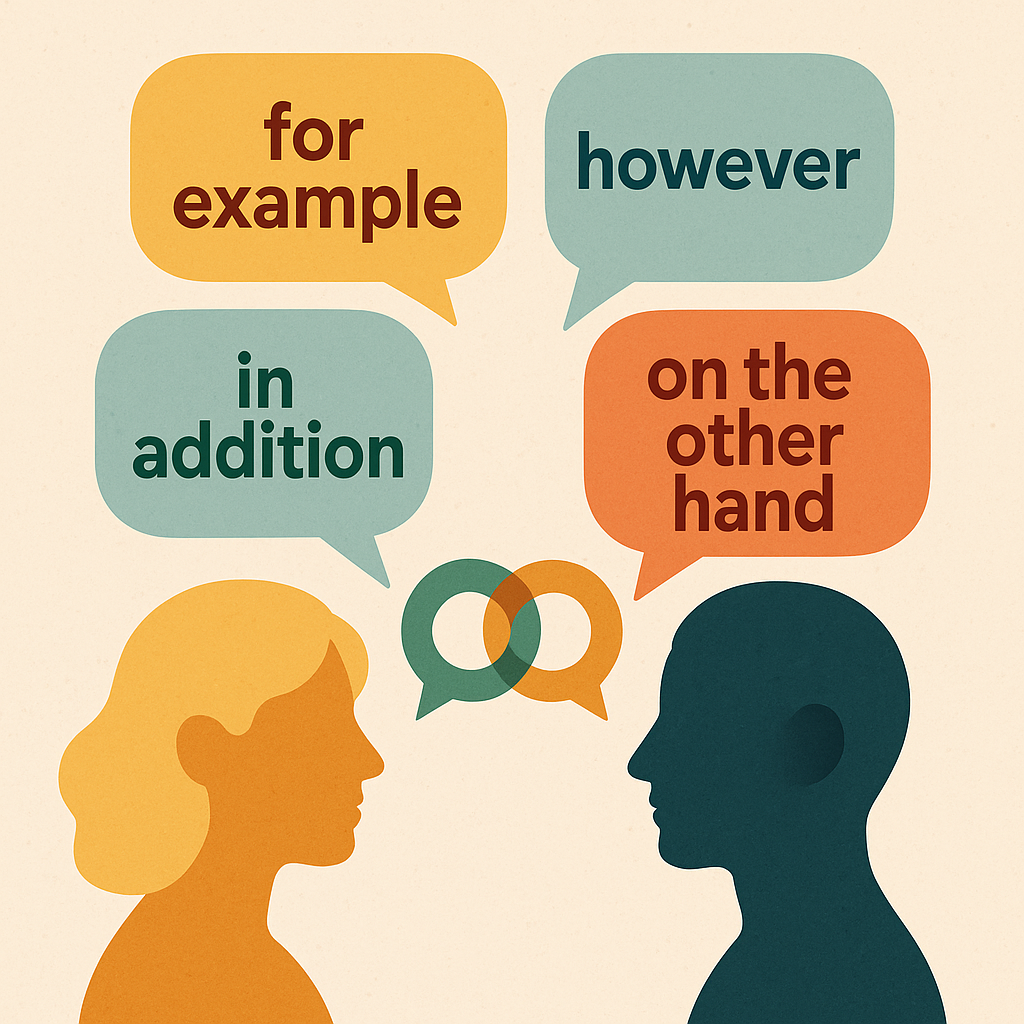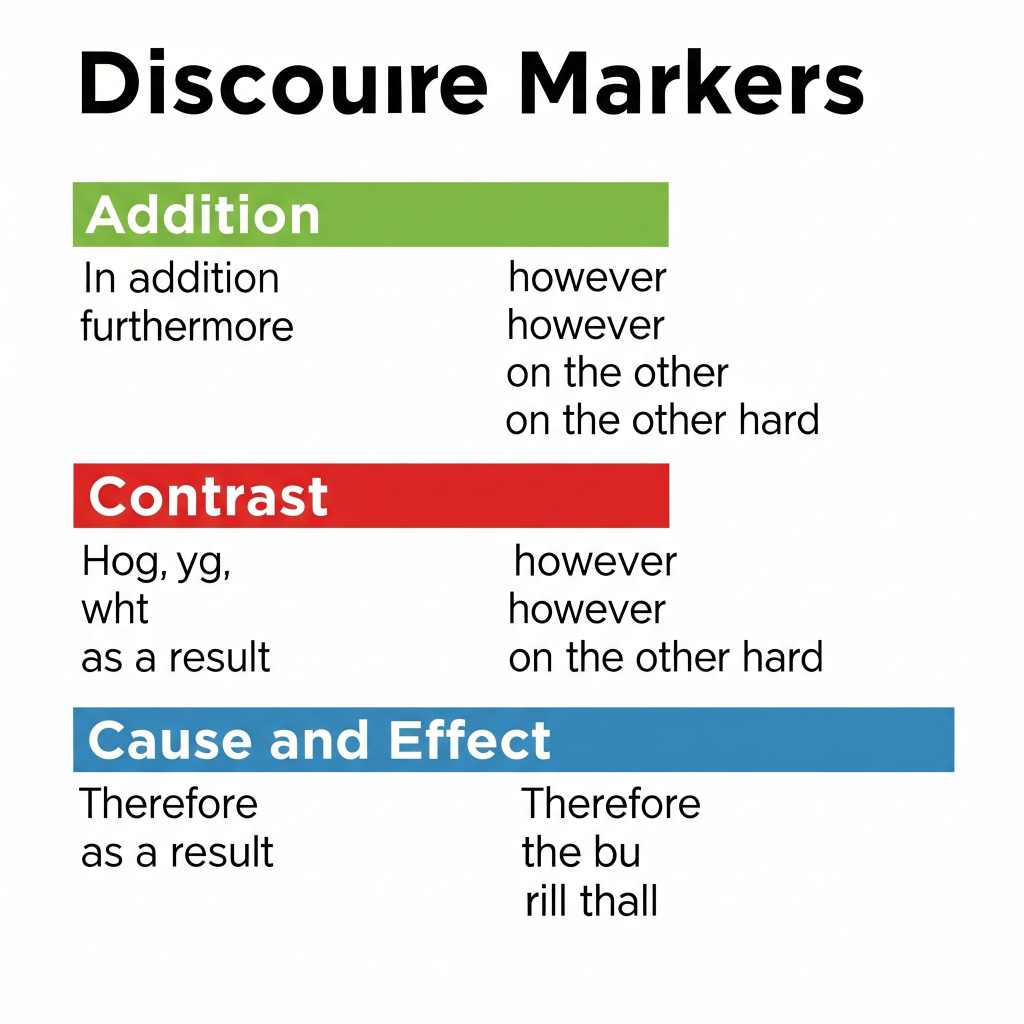So… What Are Discourse Markers (and Why Should You Care)?
Discourse markers are those little phrases that make your English sound like it’s had coffee and slept eight hours. You know—”however,” “therefore,” “on the other hand.” The things that make you sound like a thinking person, not a glitchy translation app.

They help you organize your thoughts, sound polished in meetings, and write emails that don’t scream “help me, I’m drowning in Google Translate.” If you’re into cohesive writing or fluent speaking, you’re gonna need these guys.
Why Discourse Markers Actually Matter (No, Really)
Whether you’re drafting a thesis or begging your boss for a deadline extension, discourse markers:
- Make your sentences connect, like friends who actually reply to texts.
- Help your ideas look organized, even if your desktop isn’t.
- Give your English that “educated-but-still-chill” vibe.
- Turn boring info dumps into structured arguments that don’t put people to sleep.
If you’re learning academic English or business English, you literally cannot skip this.
Discourse Markers by Function (a.k.a. Your New Verbal Superpowers)

1. The Add-Ons (Because You’ve Got More to Say)
Markers: furthermore, moreover, in addition, also, what’s more
Example: “He speaks five languages. Moreover, he’s a decent human being.”
2. The Contradictors (When Life Isn’t That Simple)
Markers: however, nevertheless, on the other hand, whereas, in contrast, although
Example: “The pitch was well-designed. However, the client hated it.”
3. The Logic Wizards (Cause → Effect)
Markers: therefore, thus, consequently, as a result, because of this
Example: “Sales were bad. Consequently, we had fewer donuts in the break room.”
4. The Drama Queens (Because Sometimes You Gotta Emphasize)
Markers: indeed, in fact, above all, especially, notably
Example: “In fact, the cat did know how to open the door. He just didn’t care.”
5. The Organizers (For People Who Actually Plan Stuff)
Markers: first, secondly, finally, next, to begin with, subsequently
Example: “First, we panicked. Then, we made a spreadsheet.”
6. The Wrap-Ups (When You’re Done Talking… Almost)
Markers: in conclusion, to sum up, overall, in summary, on the whole
Example: “In summary, let’s never do that again.”
7. The Examples (Because Nobody Believes You Without Proof)
Markers: for example, for instance, such as, namely
Example: “People make mistakes. For instance, this blog post.”
Where Do You Use These Magical Words?
Academic Writing
You’re writing something brainy. You need structure. Use discourse markers to sound like someone who didn’t just copy-paste from Wikipedia.
Want to get fancy? Read more about cleft sentences or review simple sentence structures to level up your coherence game.
“The experiment had clear results. However, the methodology was flawed. Therefore, the conclusions were tentative.”
Business Presentations
Discourse markers in business are the difference between sounding like a leader and sounding like a broken fax machine.
Bonus: learn how to adjust your tone with formal and informal English.
“To begin with, we’ll examine quarterly revenue. In contrast, marketing costs rose. Thus, we need a new plan that doesn’t involve burning money.”
How to Use Discourse Markers Without Sounding Like a Thesaurus

- Watch real people talk: TED Talks, podcasts, your boss lying during performance reviews.
- Use them where they fit: Don’t wedge “consequently” into your pizza order.
- Don’t overdo it: One “however” is fine. Four in one sentence is a cry for help.
- Ask for feedback: Yes, from actual humans. Or send it to your grammar-obsessed friend. Or me, I guess. 🙄
Learn More (Because You’re Obviously Addicted to Knowledge)
- How to Write Cohesive Paragraphs in English
- Top 10 Business English Phrases for Professional Emails
- Advanced Grammar Tips for Non-Native Speakers
- Cambridge English Writing Skills Guide
Wrap-Up (With a Challenge Because You’re Fancy Now)
Using discourse markers makes you sound smarter, more organized, and less like a malfunctioning chatbot. Practice. Play around. Ruin a few emails before you get it right.
Your turn: Pick five discourse markers from this circus and write a short paragraph about why you started learning English. Bonus points if you sneak in an idiom or two from this post.
And if you’re still hungry for linguistic power-ups, check out the rest of the Fixy Grammar Blog. We won’t judge your browser history.
